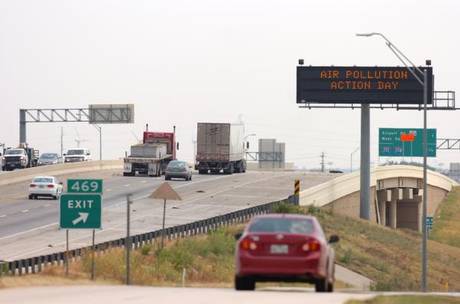It’s been a tough week for breathers in North Texas, particularly in Denton County.
Every day for more than a week now has been an “ozone action day.” Denton’s ozone monitor, once it was back online Aug. 30, quickly racked up some of the highest readings in the state, suggesting that progress in improving the region’s air quality has stalled.
It was underneath that ozone cloud that state and federal environmental officials briefed local officials, including members of the North Texas Clean Air Steering Committee, in a public meeting in Arlington this week. In a few months, the committee will begin again to try and write a plan that will improve local air quality.
Denton Mayor Mark Burroughs is chairman of the committee, a regional alliance based at the North Central Texas Council of Governments, although he was absent from the meeting Thursday.
The plan could prove pivotal to North Texas, in part because some new state and federal rules aimed at decreasing emissions from oil and gas facilities will apply only to new construction. In other words, operators of existing wells, pipelines, compressors and processing equipment in large swaths of the Barnett Shale, which is already heavily developed, aren’t subject to most new rules being rolled out by both the Texas Commission on Environmental Quality and the Environmental Protection Agency.
But the local committee could address that problem in a new plan to clean the air, one federal official told the committee and the public last week.
The most recent plan to improve the region’s air quality missed the mark so badly that the air quality in nine North Texas counties, including Denton County, was designated as “serious” last year.
Since 1997, the region had been making progress toward having no more than three eight-hour days above 85 parts per billion of ozone, but that progress seemed to stall in 2010. Currently, the average level — measured for regulatory purposes — at Denton’s monitor is 87 ppb, the highest in the region and the same level as the highest monitors in Houston.
Chronic exposure to ozone can cause a host of health problems, experts say. This month, a new study from the University of California at Berkeley found that premature death from heart disease is linked to ozone exposure.
What’s more, Wise County has been added to Dallas-Fort Worth’s nonattainment region and the area has less than five years to hit a new target: 75 ppb.
That new standard was set in 2008, although court challenges kept it from full implementation until recently. Technically, under the new lower standard, the region’s compliance is considered “moderate,” which the Texas Commission on Environmental Quality often uses to describe the region’s air quality compliance and which was repeated at least twice during the public meeting.
But the local committee must still approach its plan as if the region’s air quality problem is serious, according to Carrie Paige, an environmental scientist with the EPA.
“We have a no-backsliding rule,” Paige said.
Anti-idling measures could also be among the strategies the clean air committee pursues. The council of governments recently completed an emissions study of Barnett Shale truck trips in an effort to understand that impact on the region’s air quality.
The study likely underestimates emissions and needs additional data for future calculations, according to Lori Clark, air quality planner at the council of governments. For example, it includes a core assumption that well service trucks haul produced water from an oil or gas well to the nearest injection well, which isn’t always true.
However, the study did find that 78 percent of the emissions from that new truck traffic comes from the trucks idling, Clark said.
Currently, Collin, Dallas, Kaufman and Tarrant counties have anti-idling enforcement agreements with the TCEQ and the council of governments. They limit trucks of 14,000 pounds or more, whether gas or diesel, from idling more than five minutes.
In addition, about two dozen cities in the region also have anti-idling enforcement agreements, including Fort Worth. Little Elm is the only Denton County city participating in anti-idling measures.
TCEQ officials told the committee and the public that they expect to have ready in November the air quality models needed to begin working on the new plan, which must be completed and filed with federal officials next year.
Chris Klaus, a senior program manager for the council of governments, told TCEQ representatives that the committee would also like to hear presentations on the latest research on air quality and control technologies.
The University of Texas, the National Oceanic and Atmospheric Administration and others have been studying emissions from oil and gas fields in recent years. Some findings have shown that methane and other emissions could be much higher than previously estimated.
Klaus said it’s also important that the committee members keep an eye out for strategies that may require legislative action so that can be ready for the next session in 2015.
One possible strategy being considered in Dallas, through that city’s gas development ordinance, would require operators to purchase offsets as an incentive to further reduce emissions. That strategy could become part of a regional plan, too, according to Jim Schermbeck of Downwinders at Risk, a local air quality advocacy group, and a member of the steering committee.
The next meeting of the North Texas Clean Air Steering Committee has not been scheduled.
PEGGY HEINKEL-WOLFE can be reached at 940-566-6881 and via Twitter at @phwolfeDRC.




